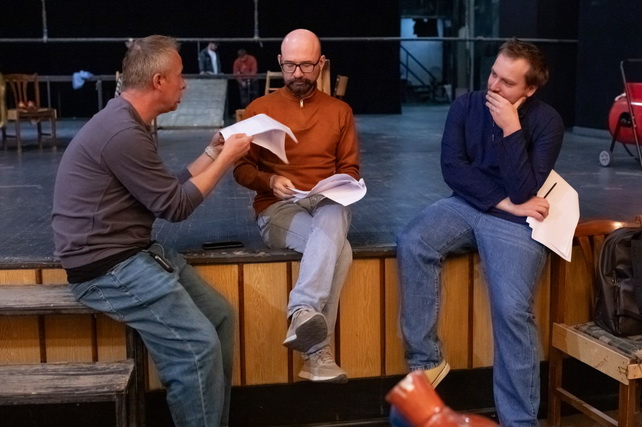
Russia holds a Directing Laboratory on the stage of Uzbekistan’s State Russian Drama Theatre
Russia holds a Directing Laboratory on the stage of Uzbekistan’s State Russian Drama Theatre
Tashkent, Uzbekistan (UzDaily.com) — A Directing Laboratory organized by the Union of Theatre Workers of Russia (STD) is taking place at the State Academic Russian Drama Theatre (GARDT) of Uzbekistan from 20 October 2025. Three Russian directors are working with Tashkent actors to stage excerpts from three plays.
This creative project will last about a week, during which sketches of the productions will be prepared. The best one will later become a full-fledged performance and enter the theatre’s repertoire.
However, more than one new production could result from the Laboratory. As one of the directors, Artur Sakharov, noted, there have been precedents where a second or even a third sketch was also successful and turned into a full-scale repertoire performance.
For Sakharov, this is his fifth Laboratory, and in Tashkent he is staging an excerpt from Tom Stoppard’s tragicomedy Rosencrantz and Guildenstern Are Dead.
When choosing a play, the directors consult with the theatre. Learning that Hamlet is currently in the Tashkent theatre’s repertoire, Sakharov decided to work on an excerpt from Stoppard’s celebrated play.
“It’s more of an alternative look at Shakespeare’s classic. Since the theatre has Hamlet, it’s interesting to see a sort of continuation — but through a nontraditional, postmodern lens. Tom Stoppard is our contemporary, and his play is a brilliant text full of intellectual humor and genre diversity. Such material is a great way to reveal actors’ potential. This tragicomedy is rare and somewhat daring to attempt — but within the Laboratory format, we can afford to take that creative risk,” Sakharov explained.
According to him, the Laboratory format — where participants are tasked with delivering significant artistic results in a short time — is extremely useful for actors, stage departments, and the theatre as a whole.
This view is shared by Konstantin Gorin, Head of the Center for Supporting Russian Theatres Abroad at the STD of Russia. Considering that GARDT’s building has been under renovation for almost two years, he noted that the Laboratory provides a much-needed opportunity for the theatre’s creative team to return to full artistic activity and focus on their true calling.
Despite the renovation, the theatre has not stood still — rehearsals for new productions continue, with the hope of premiering them in the upcoming season.
According to Regina Kazakova, Assistant to the Head of the Theatre’s Literary Department, rehearsals are underway for Molière’s The Bourgeois Gentleman and Aleksandr Volodin’s Farewell in June. Work on these plays will resume after the Laboratory concludes, as all rehearsal spaces and most actors are currently involved in the project.
The Laboratory will also result in a new production that may premiere in the coming season. Gorin expressed hope that it could even open GARDT’s next theatrical year, by which time the theatre expects the renovation to be completed.
“This partnership between the Union of Theatre Workers of Russia and the State Russian Drama Theatre of Uzbekistan will certainly continue. Following the Laboratory, a full-scale production will be staged in 2026. Previously, we have already sent Russian experts here in key theatrical disciplines such as acting and stage speech, and we intend to expand this cooperation,” Gorin said.
The creative process at the Laboratory has been lively and inspiring. Alongside Sakharov’s work, GARDT actors are rehearsing two more excerpts — Viy by Nikolai Gogol under director Sofya Ovsyannikova, and A Country Doctor’s Notebook by Mikhail Bulgakov under Aleksandra Kokhan.
“Theatre is living energy — an energy created by the team of artists and shared with the audience. Despite all challenges, theatre remains vital because it allows people to experience emotions together, to empathize with characters, and to reflect on themselves,” Kokhan said when asked about the enduring value of theatre.
Audiences eagerly await the reopening of performances on the stage of one of Uzbekistan’s oldest and most beloved theatres.